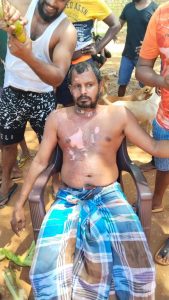Some were given bail years ago, while some were awaiting trail and are yet to be charge-sheeted; they continue to remain in jail.

Sri Lankan Tamils rushed to the hospital after trying to take their lives at a protest. (South First/ Umar Sharieef)
On June 25, at least 30 Sri Lankan Tamils in a special camp at the central prison in Tiruchirappalli tried to end their lives in protest against their detention.
This isn’t the first time such an incident has taken place here.
In October 2021, as many as 20 detainees at the special camp attempted to take their lives by cutting their body parts with sharp objects.
Jamuna Rani, Deputy Collector and in-charge of the special camp, told South First no casualties were reported in both incidents.
Fernando, a 30-year-old Sri Lankan Tamil, told South First that nearly 30 Sri Lankan Tamils have, for a month now, been protesting against their detention at the prison.
There are 114 Sri Lankan Tamils in this special camp, said Rani.
The state government arrested them under the Passport Act in 2012 and lodged them at this special camp.
People of other nationalities, including Bangladeshis, are also lodged there.
Q-branch officials have also lodged former members of the Liberation Tigers of Tamil Eelam (LTTE) in this camp.
Led by Velupillai Prabhakaran, the LTTE fought for an independent state for Tamils in North and East Sri Lanka from 1983-2009.
The detainees who South First spoke to said they wanted to go back to their country.
Fernando alleged that officials at the camp were not heeding the plights of Sri Lankan Tamils.

Uma Raman, a Sri Lankan Tamil, attempted suicide inside the special camp. (South First/Umar Sharieef)
Like him, 40-year-old Uma Raman was also arrested by Q-branch officials under the Passport Act. He set himself ablaze on 24 June, protesting against his detention.
District Collector Pradeep Kumar told South First that he sustained burns and was under treatment.
In another case, some Sri Lankan Tamils also overdosed on sleeping pills.
“They managed to get sleeping pills through their relatives who visited them. However, I ordered an enquiry in this regard. All of them who attempted to take their lives are safe and being monitored by the health officials,” the collector said.
A human rights activist told South First on a condition of anonymity that officials are not taking enough action on the issue.
According to the guidelines issued by the state’s Department of Rehabilitation and Welfare of Non-Residents in response to a 2005 RTI, if inmates are not associated with militant movements, they may be shifted to the special camps at Poonamallee in the Thiruvallur district and Chengalpattu in the Kancheepuram district.
Meanwhile, at least 10 Sri Lankan inmates arrested in 2012 were acquitted of all charges, and yet continue to be housed at the special camp.
Johnson, an advocate representing the Sri Lankan detainees, told South First it was unclear why the government continues to detain them.
For 30 Inmates, the trial is yet to begin, he added.
“We have been protesting for the past 35 days and some for many years. Every time we protest, officials convince us that relief is on the way.”
Johnson said his clients’ detention without the filing of a charge sheet is ultimately a human rights violation.
A charge sheet should be filed within 60-90 days by the police.
“The responsibility lies with the state government. It has the right to release these detained Sri Lankan Tamils. The Union government’s GO in 1958 gave it full authority to decide,” said Johnson.
He claimed the state government has not taken any action to derive political mileage out of it.
Johnson also alleged that the state government only believes what the police say and acts accordingly for political motives.
He also blamed National Human Rights Commission and State Human Rights Commission for letting this unfold.
“They come to the special camp, talk with them, examine the premises, and go. They have never acted,” said Johnson.
Another inmate told South First that the uncertain future at the camp haunts them.
“We want to go to our country. We don’t want to live in a special camp and suffer. Most of us have completed the term and are still in the camp. Our struggle to get freed from here goes unheard, and as a result, we had to resort to such steps,” he said.
“We are ready to die in our country without food but not here as a slave,” he added.
Sri Lanka is currently reeling under an unprecedented economic crisis, marked by a severe shortage of essential services, something that has led to 12 deaths in fuel queues.
Many Sri Lankan Tamils have fled to Tamil Nadu to escape the economic crisis since early April this year.
However, Sri Lankans in the special camp still want to go back to their country.
Kumar said: “We have sent the report to the top officials and await their response. The government is taking steps on this issue.”
The district collector added: “Six of the inmates are now facing deportation cases, and for many, the trial is yet to begin. However, for those who lodged for other issues than the passport act, the court has to decide on their release.”
A few of the inmates’ families also live in refugee camps.
Amudha, the kin of one of the inmates, told South First that the situation inside the special camp is alarming.
“We suffer a lot here as we are away from family members. I request the government to file a charge sheet and begin the trial to let us prove we are innocent. It is so disheartening to go through all this,” said this individual.

May 18, 2024

May 18, 2024

May 18, 2024

May 18, 2024

May 16, 2024

May 16, 2024